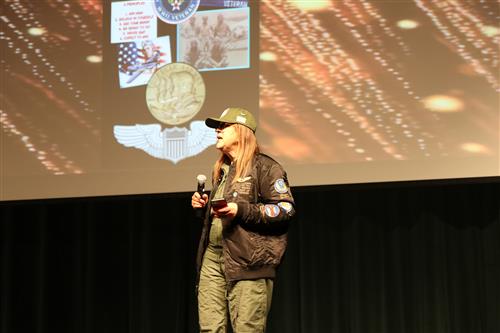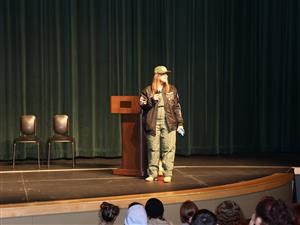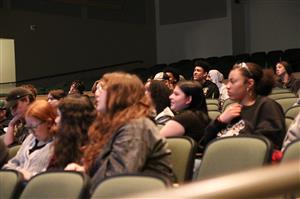- Spokane Public Schools
- More SPS Stories
Shadle Park students learn about Tuskegee legacy during Black History Month
Posted by Theresa Tanner on 3/6/2024

On Thursday, Feb. 29, Shadle Park High School’s College & Career Center hosted a special presentation for Black History Month: “The Power of Legacy: A Tuskegee Airman” featuring Rhonda Leonard-Horwith.
Ms. Leonard-Horwith, a retired attorney, is the daughter of retired United States Air Force Lt. Col. Harlan Quetin Leonard Jr. (1926-2023), a Documented Original Tuskegee Airmen (DOTA) who attended pilot training at Tuskegee in 1944.
Every week, Shadle Park High School College and Career Readiness Specialist April Eberhardt invites different speakers to share with students about their careers for “Empowerment Thursdays.”
“Students don’t know what they don’t know,” explained Ms. Eberhardt. “So this gives them some inspiration about what they may want to do, and find the personal connections with people about how they got where they were going.”
She’ll often ask students what they’re interested in – forensics, occupational therapy, banking, poetry – and reach out to professionals in those industries.
“Inspire, empower and expose,” is what Ms. Eberhardt wants for her students, so she can help them figure out what they need to do now as a student to make those dreams a reality – whether that’s filling out the FAFSA for financial aid to pursue college, vocational training, or an apprentice program, or coordinating internship opportunities for a student’s Career & Technical Education pathway.

“Living history”
When Ms. Eberhardt met Ms. Leonard-Horwith and heard her story, she knew she had to get her in to speak with Shadle Park students.
“Her father was a trailblazer, but still experienced discrimination and segregation. It’s important for students to hear her story, especially for Black History Month. She’s living history.”
In Shadle Park’s auditorium, dressed in a flight suit and jacket with Tuskegee and Air Force patches in honor of her father, Ms. Leonard-Horwith shared with students her and her father’s personal histories, as well as the challenges and impact of the first African American pilots for the United States military.
“They had a double victory because they had two wars to fight: One in Europe in World War II, and one in America against segregation,” she told students, emphasizing that military leaders even doubted that Black pilots could fly aircrafts until First Lady Eleanor Roosevelt took a flight with aviator Charles Alfred Anderson Sr. in 1941.
Ms. Leonard-Horwith spoke about growing up on military bases in Maryland, where Black service members had a 4 p.m. curfew because it was too dangerous in the area for them to be out after dark. “I was sick with worry for my father.”

She also experienced discrimination herself, as her high school guidance counselor discouraged her from going to college. “’You people don’t do well there, you cook there,’” she was told. She was accepted to several universities, including her alma mater, the University of California, Riverside.
And her father always challenged her to do better than him. “He had one degree, so I got two.” She shared about her professional goals and accomplishments, and how she follows the Six Guiding Principles of Tuskegee Airmen: Aim High, Use Your Brain, Believe in Yourself, Be Ready to Go, Expect to Win and Never Quit.
It has been an honor for Ms. Leonard-Horwith to see her father and the legacy of Tuskegee airmen honored in recent years with a Congressional Gold Medal, floats in parades, statues and memorials in the United State and Italy, and even a big screen portrayal in the 2012 film “Red Tails.”
“It was a wonderful presentation,” Shadle sophomore Nikita Habimana said. “It was insightful and enlightening. It’s inspiring for young people of color – for everyone – because it helps us see that we can do anything we put our minds to.”
Recent
By Month
- April 2024
- March 2024
- February 2024
- January 2024
- November 2023
- October 2023
- September 2023
- August 2023
- July 2023
- June 2023
- May 2023
- April 2023
- March 2023
- February 2023
- January 2023
- December 2022
- November 2022
- October 2022
- September 2022
- August 2022
- July 2022
- June 2022
- May 2022
- April 2022
- March 2022
- February 2022
- January 2022
- December 2021
- November 2021
- October 2021
- September 2021
- August 2021
- July 2021
- June 2021
- May 2021
- April 2021
- March 2021
- February 2021
- December 2020
- November 2020
- October 2020
- March 2020
- November 2019
- October 2019
- May 2019
- April 2019
- February 2019
- January 2019
- November 2018
- October 2018
- September 2018

